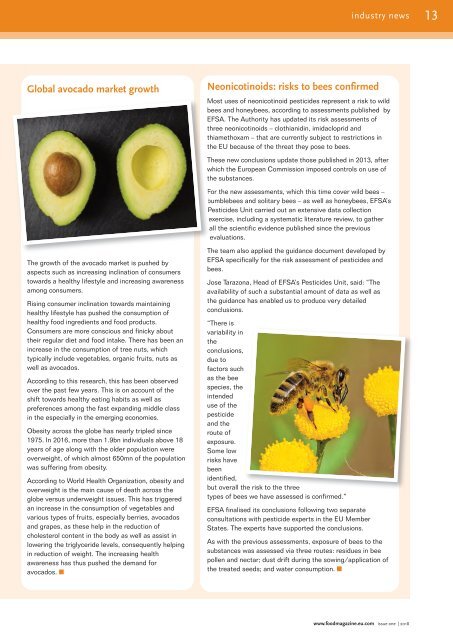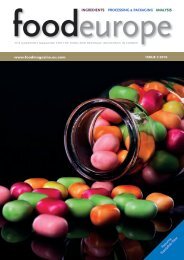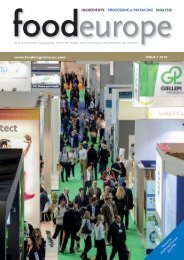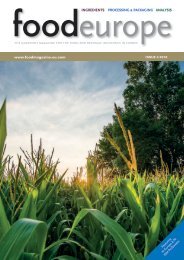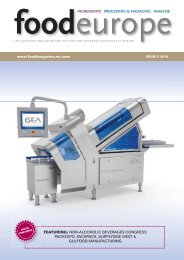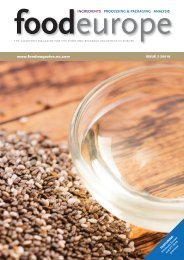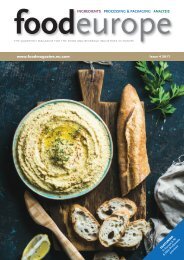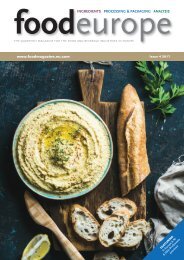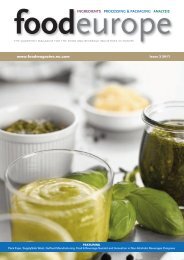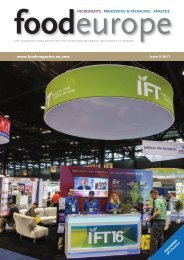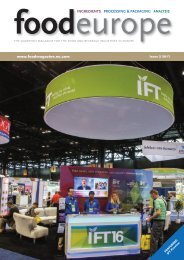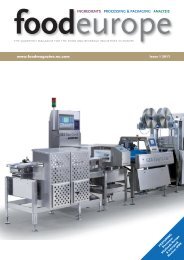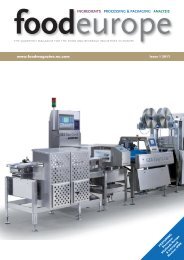Issue_1_2018
You also want an ePaper? Increase the reach of your titles
YUMPU automatically turns print PDFs into web optimized ePapers that Google loves.
industry news<br />
13<br />
Global avocado market growth<br />
Neonicotinoids: risks to bees confirmed<br />
Most uses of neonicotinoid pesticides represent a risk to wild<br />
bees and honeybees, according to assessments published by<br />
EFSA. The Authority has updated its risk assessments of<br />
three neonicotinoids – clothianidin, imidacloprid and<br />
thiamethoxam – that are currently subject to restrictions in<br />
the EU because of the threat they pose to bees.<br />
These new conclusions update those published in 2013, after<br />
which the European Commission imposed controls on use of<br />
the substances.<br />
For the new assessments, which this time cover wild bees –<br />
bumblebees and solitary bees – as well as honeybees, EFSA’s<br />
Pesticides Unit carried out an extensive data collection<br />
exercise, including a systematic literature review, to gather<br />
all the scientific evidence published since the previous<br />
evaluations.<br />
The growth of the avocado market is pushed by<br />
aspects such as increasing inclination of consumers<br />
towards a healthy lifestyle and increasing awareness<br />
among consumers.<br />
Rising consumer inclination towards maintaining<br />
healthy lifestyle has pushed the consumption of<br />
healthy food ingredients and food products.<br />
Consumers are more conscious and finicky about<br />
their regular diet and food intake. There has been an<br />
increase in the consumption of tree nuts, which<br />
typically include vegetables, organic fruits, nuts as<br />
well as avocados.<br />
According to this research, this has been observed<br />
over the past few years. This is on account of the<br />
shift towards healthy eating habits as well as<br />
preferences among the fast expanding middle class<br />
in the especially in the emerging economies.<br />
Obesity across the globe has nearly tripled since<br />
1975. In 2016, more than 1.9bn individuals above 18<br />
years of age along with the older population were<br />
overweight, of which almost 650mn of the population<br />
was suffering from obesity.<br />
According to World Health Organization, obesity and<br />
overweight is the main cause of death across the<br />
globe versus underweight issues. This has triggered<br />
an increase in the consumption of vegetables and<br />
various types of fruits, especially berries, avocados<br />
and grapes, as these help in the reduction of<br />
cholesterol content in the body as well as assist in<br />
lowering the triglyceride levels, consequently helping<br />
in reduction of weight. The increasing health<br />
awareness has thus pushed the demand for<br />
avocados. ■<br />
The team also applied the guidance document developed by<br />
EFSA specifically for the risk assessment of pesticides and<br />
bees.<br />
Jose Tarazona, Head of EFSA’s Pesticides Unit, said: “The<br />
availability of such a substantial amount of data as well as<br />
the guidance has enabled us to produce very detailed<br />
conclusions.<br />
“There is<br />
variability in<br />
the<br />
conclusions,<br />
due to<br />
factors such<br />
as the bee<br />
species, the<br />
intended<br />
use of the<br />
pesticide<br />
and the<br />
route of<br />
exposure.<br />
Some low<br />
risks have<br />
been<br />
identified,<br />
but overall the risk to the three<br />
types of bees we have assessed is confirmed.”<br />
EFSA finalised its conclusions following two separate<br />
consultations with pesticide experts in the EU Member<br />
States. The experts have supported the conclusions.<br />
As with the previous assessments, exposure of bees to the<br />
substances was assessed via three routes: residues in bee<br />
pollen and nectar; dust drift during the sowing/application of<br />
the treated seeds; and water consumption. ■<br />
www.foodmagazine.eu.com issue one | <strong>2018</strong>


